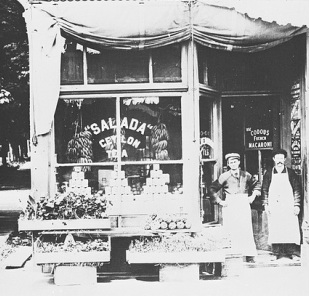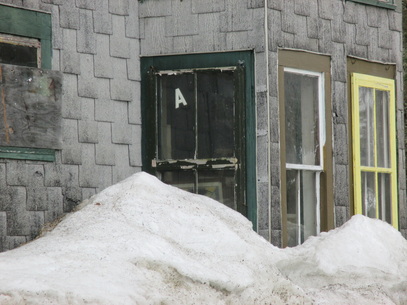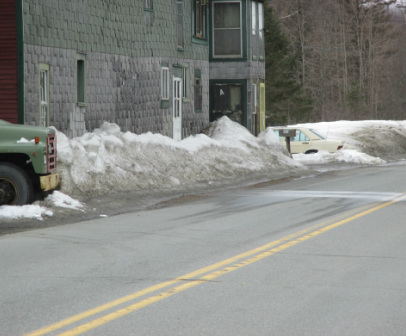
This isn't the store mentioned in this post. But I think the time period is about right. The railroad-crossing store evidently lacked the "Ceylon" lettering between "Salada" and "Tea," unless those letters had already come unglued before I moved to town.
A close family member once remarked that a USA Today-style pie chart of my brain would consist of three color-coded wedges of approximately equal size, labeled "Bicycles," "Palindromes," and "Other." That assessment is proportionally in the right ballpark, I admit, but it's slightly misleading. The pie-chart model implies that those sectors are completely separate from one another, while the reality is that there's a certain amount of shading from one color into the next
For those who may not know this, I should explain that a palindrome is a word or series of words that’s the same spelled the same from right to left as it is from left to right, as in the word "racecar".
For multiple-word palindromes—something like “navy van,” say—you’re allowed to adjust the word spacing however you want as long the order of the letters is unchanged. That is, although “navy van” spelled backwards is literally “nav yvan,” it’s permissible to shift the space so it reads more naturally. It’s also okay to add or remove punctuation to suit yourself. (I didn’t create those rules, by the way—that’s just the way it is.)
There are a few classic palindromes that just about everyone knows, such as the one about Theodore Roosevelt and the Panama Canal: “A man, a plan, a canal—Panama!” Another has to do with Adam’s supposed first words to Eve: “Madam, I’m Adam.”
The reason that these two are so well known, I think, is that they actually make some sense. Most palindromes that are more than a few words long tend to be kind of sketchy in terms of meaning.
For those who may not know this, I should explain that a palindrome is a word or series of words that’s the same spelled the same from right to left as it is from left to right, as in the word "racecar".
For multiple-word palindromes—something like “navy van,” say—you’re allowed to adjust the word spacing however you want as long the order of the letters is unchanged. That is, although “navy van” spelled backwards is literally “nav yvan,” it’s permissible to shift the space so it reads more naturally. It’s also okay to add or remove punctuation to suit yourself. (I didn’t create those rules, by the way—that’s just the way it is.)
There are a few classic palindromes that just about everyone knows, such as the one about Theodore Roosevelt and the Panama Canal: “A man, a plan, a canal—Panama!” Another has to do with Adam’s supposed first words to Eve: “Madam, I’m Adam.”
The reason that these two are so well known, I think, is that they actually make some sense. Most palindromes that are more than a few words long tend to be kind of sketchy in terms of meaning.

Compare the stick-on "A" shown here to the letters in the old photo above. You can see from its position that it was originally the second letter in the word "Salada."
The missing letters are still lying on the floor inside unless someone picked them up as they fell.
For example, consider “Draw not New York! Roy went onward.” That’s one of my own discoveries, so I have a certain affection for it even though it’s not the kind of phrase that sees much use in everyday conversation. The same would also have to be said of “Pa, can I repel a leper in a cap?” or “No Geronimo mom in Oregon.”
But the thing is, searching out palindromes is something like panning for gold in a stream without much gold—you have to put in a lot of hours, keep your expectations low, and hope to come up with a small nugget every now and then.
And because you can’t tell what a finished palindrome is going to look like until you’re actually looking at it, a lot of the finds are naturally going to be kind of misshapen. At that point—given the time and effort already expended—there’s a tendency to just file it away and hope that something better will come along eventually.
As a general rule, I don’t do much palindroming while bicycling, mostly because riding a bike is an interesting activity in and of itself. (Long solo car trips, on the other hand, are ideal for palindrome work—lots of signs to look at and not much else to do.)
But you never know when inspiration will strike. A couple of weeks ago I took advantage of an unseasonably warm early-spring day by taking a bike ride over the hill to a neighboring valley and back—a familiar 15-mile loop that I probably ride at least a dozen times a year.
There’s a semi-abandoned old store at what used to be a crossing on the St. Johnsbury & Lamoille County Railroad (people used to say that SJ & LC was an abbreviation for “Slow, Jerky, and Long-Coming.) Many years ago, like a lot of small rural stores, it had a Salada Tea advertisement on both of the windows that faced the road. The white block letters were stuck directly to the inside surface of the glass, with “SALADA” in a curve near the top of the window and “TEA” in a straight line below it.
When I first moved to the area, thirty-odd years ago, the store was already falling into disrepair and the sign was missing a few letters even then. When I first saw it, I think it said something along the lines of “SAL D T A.” Every so often another letter would fall as the place continued its gradual slide toward oblivion.
But the thing is, searching out palindromes is something like panning for gold in a stream without much gold—you have to put in a lot of hours, keep your expectations low, and hope to come up with a small nugget every now and then.
And because you can’t tell what a finished palindrome is going to look like until you’re actually looking at it, a lot of the finds are naturally going to be kind of misshapen. At that point—given the time and effort already expended—there’s a tendency to just file it away and hope that something better will come along eventually.
As a general rule, I don’t do much palindroming while bicycling, mostly because riding a bike is an interesting activity in and of itself. (Long solo car trips, on the other hand, are ideal for palindrome work—lots of signs to look at and not much else to do.)
But you never know when inspiration will strike. A couple of weeks ago I took advantage of an unseasonably warm early-spring day by taking a bike ride over the hill to a neighboring valley and back—a familiar 15-mile loop that I probably ride at least a dozen times a year.
There’s a semi-abandoned old store at what used to be a crossing on the St. Johnsbury & Lamoille County Railroad (people used to say that SJ & LC was an abbreviation for “Slow, Jerky, and Long-Coming.) Many years ago, like a lot of small rural stores, it had a Salada Tea advertisement on both of the windows that faced the road. The white block letters were stuck directly to the inside surface of the glass, with “SALADA” in a curve near the top of the window and “TEA” in a straight line below it.
When I first moved to the area, thirty-odd years ago, the store was already falling into disrepair and the sign was missing a few letters even then. When I first saw it, I think it said something along the lines of “SAL D T A.” Every so often another letter would fall as the place continued its gradual slide toward oblivion.

Alas! Thirteen down, one to go.
I bet O. Henry could have written a nice short story about this place.
I guess I hadn’t thought about it in some time, but on my recent ride by I happened to notice that there was only one letter remaining—just the first “A” in “SALADA.” For some reason—maybe because I’d just turned 60—that realization filled me with melancholy. While pedaling up the long hill beyond the store, I found myself thinking of the letters falling, unnoticed, one by one, and reflecting on the brevity of human life. I wondered when the last letter would fall, and where I would be when it did. (For more on this theme, go to http://www.online-literature.com/o_henry/1303/ and read the classic O. Henry short story The Last Leaf.)
But as I neared the top of the hill, another part of my brain—which had evidently been clattering away unnoticed for the past mile or so—clicked into gear and delivered a completed palindrome I hadn’t even realized I’d been working on:
“Salada ad? Alas!”
But as I neared the top of the hill, another part of my brain—which had evidently been clattering away unnoticed for the past mile or so—clicked into gear and delivered a completed palindrome I hadn’t even realized I’d been working on:
“Salada ad? Alas!”
 RSS Feed
RSS Feed